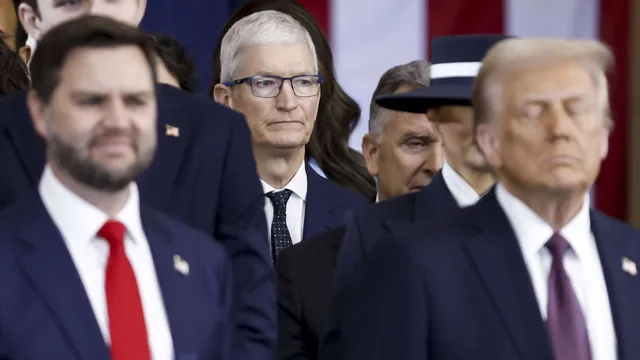
Trump's tariffs drive lobbyists to unprecedented profit levels
2025-04-27 13:55- Lobbying expenditures on trade issues surged in early 2025, indicating increased lobbying activity.
- Tariffs have compelled businesses to engage lobbyists for competitive advantages in the market.
- The current economic landscape showcases a growing divide, with lobbyists profiting while American families face economic hardships.
Express your sentiment!
Insights
In the United States, lobbying related to trade policy has surged dramatically due to President Donald Trump's trade war. Reports indicate that expenditures on trade issues soared by 277 percent in the first quarter of 2025 compared to the same period in 2024, reaching $4.9 million, up from $1.3 million the previous year. This increase reflects a significant rise in the number of firms engaging in tariff lobbying, with 212 entities reported in early 2025, compared to only 89 in early 2024. This trend sheds light on the relationship between trade protectionism and lobbying, as many businesses seek to navigate the complexities introduced by tariffs. For instance, firms may lobby for tariff relief on their materials while simultaneously advocating for higher tariffs against their competitors. This has resulted in a convoluted scenario where the desire for protective policies inadvertently leads to an expansion of lobbying activities and potential corruption. Moreover, Trump-aligned lobbyists have capitalized on this environment, generating unprecedented income from corporate clients eager to gain favor with the administration. Noteworthy lobbying firms like Ballard Partners have reported earning millions from various major corporations that have sought out connections with the Trump administration. During the first three months of 2025 alone, Ballard Partners earned $14.3 million, illustrating how lucrative this alliance has become. As businesses become increasingly reliant on lobbying to circumvent tariffs or gain competitive advantages, the implications for the economy become concerning. A study from Lehigh University revealed that politically connected firms, particularly those that contributed to Republican campaigns, were more likely to receive exemptions from tariffs. This phenomenon raises questions about fairness and access in the marketplace, as not all businesses can afford to hire lobbyists or contribute sizeable sums to political campaigns. Ultimately, while the lobbying sector may be thriving amid these policies, many American families are left shouldering the burden of increased costs and market instability induced by these protective trade measures.
Contexts
The impact of tariffs on American manufacturers has been a subject of significant debate, especially as the global trade landscape continues to evolve. Tariffs, which are taxes imposed on imported goods, serve as a tool for governments to protect domestic industries from foreign competition. For American manufacturers, this means that higher tariffs on foreign goods can create a more favorable environment for local production. However, the repercussions are multifaceted and involve both positive and negative outcomes that merit close examination. A key argument in favor of tariffs is that they encourage domestic manufacturing by making imported goods more expensive, thus nudging consumers towards buying American-made products. This can lead to a potential increase in jobs and investment within the manufacturing sector, fostering economic growth and stability in certain industries reliant on domestic production. Moreover, by imposing tariffs, the government can defend strategic sectors deemed critical for national security and innovation, further strengthening the economy. Conversely, the negative effects of tariffs on American manufacturers cannot be overlooked. While aimed at boosting local businesses, tariffs can increase the cost of raw materials and intermediate goods sourced from abroad, which may harm manufacturers reliant on these imports. If domestic manufacturers face rising production costs, they might be compelled to raise prices for consumers, potentially leading to a decline in demand for their products. In this scenario, the intended benefits of tariffs—such as job creation and economic protection—may be offset by pricing issues that could make American goods less competitive in both domestic and international markets. Furthermore, trade partners often retaliate against tariffs, leading to trade wars that can exacerbate the situation for American manufacturers. Such retaliatory measures may include imposing their own tariffs on American goods, further straining inter-country relations and harming exporters. The interdependence of the global economy means that the repercussions of tariffs can ripple across various industries and markets, complicating the landscape for American manufacturers. As manufacturing has increasingly become a global endeavor, reliance on a wide array of supply chains means that tariffs could disrupt established business models and lead to long-term uncertainty regarding production costs and market accessibility. The evolving nature of the global economy, coupled with the shifting policies surrounding tariffs, calls for ongoing vigilance and adjustment by American manufacturers. To navigate these challenges, businesses may seek innovative strategies such as diversifying supply chains, investing in automation, or advocating for trade policies that enhance competitive advantages without jeopardizing international relationships. The future success of American manufacturers in the face of tariffs will largely depend on their agility and willingness to adapt to a dynamic trade environment while working towards a balanced approach to protecting domestic interests without stifling growth.